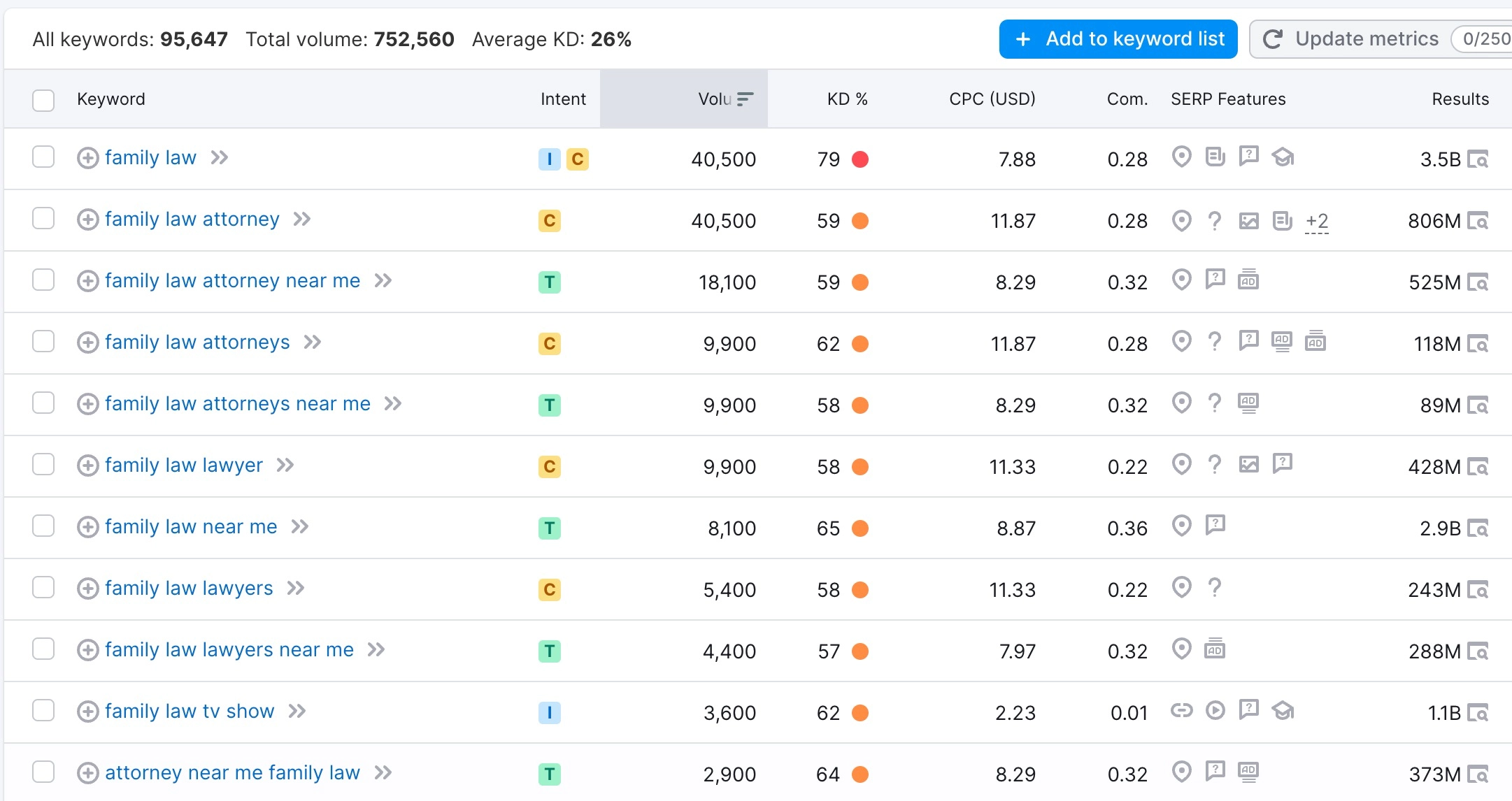SEO for family law has become increasingly important in the digital age. Many people turn to search engines to find legal services and information related to family matters.
In today’s interconnected world, having a strong online presence is crucial for businesses across all industries. The legal field is no exception.
Leveraging SEO strategies positions your family law firm in top search results. This attracts potential clients seeking your services or information.
The Role of SEO in the Legal Industry, Specifically SEO for Family Law
In the legal industry, competition is fierce, and family law is no exception.
SEO plays a critical role in helping family law firms establish a strong online presence. They can connect with potential clients and ultimately grow their practice.
Optimizing your website for search engines ensures visibility in relevant searches. It helps clients find your firm for family law representation or guidance.
SEO for family law enhances online visibility and builds credibility. It fosters trust with potential clients seeking your expertise.
Does SEO Work for Law Firms?
The Impact of SEO on Law Firms
SEO has a significant impact on law firms, as it helps them attract potential clients who are actively searching for legal services online. A well-executed SEO strategy can provide numerous benefits for law firms, including:
- Optimized content means increased online visibility.
- Higher search rankings equal easier client discovery.
- Effective SEO equals more targeted website traffic equals higher conversion rates.
- High search rankings mean enhanced credibility and trust with potential clients.
- SEO is cost-effective compared to traditional advertising methods, allowing for efficient marketing resource allocation.
Why Local SEO is Important for Family Law Firms
The Connection Between Local Search and Client Acquisition in Family Law
Local SEO is vital for family law firms. Clients often require face-to-face interaction, so proximity is important.
Optimizing your website and content for local search targets potential clients effectively. Local firms inspire more trust with clients seeking sensitive family legal issues.
Key aspects of local SEO for family law firms include:
- To optimize your Google My Business listing, make sure your contact information, address, and business hours are accurate. Consistency across all online platforms is essential. This will improve your visibility in local search results for family law-related queries.
- Encourage satisfied family law clients to write positive reviews to improve your firm’s online reputation. This increases the likelihood that potential clients will choose your services over competitors.
- To target local family law keywords, include location-specific keywords in your website’s content, meta tags, and URL structure. Search engines will understand your firm’s geographical focus and present your website to users searching for local family law services.
How Local SEO Can Improve a Family Law Firm’s Visibility in Search Results
Local SEO enhances family law firm visibility in search results. It positions your firm in front of potential clients searching for family law services in your area. Some strategies for enhancing your family law firm’s local SEO include:
- Creating location-specific family law content: Publishing blog posts and articles that address local family law issues, news, or events help your website rank for location-based family law keywords. This makes it easier for potential clients to find your firm.
- Building local citations: Ensuring your family law firm is listed on relevant local directories and websites can boost your online presence and improve your chances of being discovered by potential clients in need of family law services.
- Earning high-quality backlinks: Obtaining backlinks from reputable, local websites related to family law or legal services can strengthen your website’s authority and improve your search engine rankings.
- Optimizing for mobile devices: As more people use their smartphones to search for local family law services, it’s essential to ensure that your website is mobile-friendly and easy to navigate on various devices.
Local SEO tailored to family law helps firms target potential clients in their area. It increases chances of being found by those who need their services the most.
This, in turn, can lead to more client inquiries, higher conversion rates, and overall growth for your family law practice.
The Importance of Regular Blog Posts for SEO for Family Law
How Consistent Content Boosts SEO Efforts
Regular blog posts are essential for family law firms looking to improve their SEO efforts.
Consistently publishing high-quality, informative content on your website not only demonstrates your expertise in the field of family law but also signals to search engines that your website is active and up-to-date.
No products found.
This can lead to higher search engine rankings, increased website traffic, and more potential clients. The benefits of consistent content for family law firms include:
- Establishing authority: By addressing common questions and concerns related to family law, you can position your firm as an expert in the field and build credibility with potential clients.
- Targeting long-tail keywords: Regular blog posts allow you to target specific, long-tail keywords that potential clients may use when searching for family law services. This can improve your search engine rankings and help you reach a more targeted audience.
- Encouraging social sharing: Engaging and informative content is more likely to be shared on social media platforms, which can boost your online presence and drive additional traffic to your website.
Tips for Creating Engaging and Informative Blog Posts for Family Law Firms
To create engaging and informative blog posts for your family law firm, consider the following tips:
- Focus on relevant topics: Choose topics that are relevant to your target audience and address their most pressing concerns or interests. This might include discussing recent changes in family law, exploring common misconceptions, or offering practical advice for dealing with specific issues.
- Provide actionable advice: Aim to provide practical and actionable advice that readers can apply to their own situations. This can help build trust with potential clients and demonstrate your expertise in family law.
- Use a conversational tone: Write in a conversational tone that is easy to understand and avoids legal jargon. This will make your content more accessible to a wider audience and increase the likelihood that readers will engage with your posts.
- Incorporate multimedia elements: Enhance your blog posts with relevant images, infographics, or videos to make your content more visually appealing and easier to digest.
- Optimize for SEO: Be sure to incorporate relevant keywords and phrases throughout your content, as well as in your headings, meta tags, and URL structure. This will improve your chances of ranking higher in search results for those terms.
By consistently creating engaging and informative blog posts, family law firms can improve their SEO efforts, attract more potential clients, and ultimately grow their practice.
Keyword Research for SEO in Family Law
How to Conduct Keyword Research for Family Law
Keyword research is a crucial component of any successful SEO strategy, including for family law firms. Identifying the right keywords to target in your content can help you rank higher in search results and attract potential clients who are actively searching for family law services.
Here’s how to conduct keyword research for family law:
- Brainstorm topics: Begin by brainstorming a list of topics related to family law, such as divorce, child custody, alimony, or prenuptial agreements. Consider the issues and questions your potential clients might have, as well as the services your firm provides.
- Use keyword research tools: Utilize keyword research tools, such as Google Keyword Planner, SEMrush, or Ahrefs, to generate a list of potential keywords related to your topics. These tools can provide valuable information, including search volume, keyword difficulty, and competition level.
- Analyze search intent: Determine the search intent behind each keyword, which is the reason why a user is searching for that particular term. Focus on keywords with clear commercial or informational intent, as these are more likely to attract potential clients.
- Identify long-tail keywords: Long-tail keywords are longer and more specific phrases that users are likely to search for when seeking family law services. Targeting long-tail keywords can help you rank higher for those terms and attract a more targeted audience.
- Evaluate competition: Analyze the search results for your chosen keywords and assess the competition. Consider targeting keywords with lower competition levels, as they may be easier to rank for.
Incorporating Keywords in Blog Posts for Family Law Firms
Once you have identified your target keywords, it’s essential to incorporate them strategically throughout your blog posts. Here are some tips for integrating keywords into your family law content:
- Include keywords in titles and headings: Use your target keywords in blog post titles and headings (H1, H2, H3) to signal to search engines that your content is relevant to those terms.
- Use keywords naturally in the body text: Incorporate your target keywords throughout your content in a natural and readable manner. Avoid keyword stuffing, which can harm your search engine rankings.
- Add keywords to meta tags: Include your target keywords in the meta title and meta description tags for each blog post. This can help improve your visibility in search results.
- Utilize keywords in image alt text: If your blog post contains images, be sure to include your target keywords in the image alt text. This can improve your website’s SEO and make your content more accessible.
- Monitor keyword performance: Regularly track your keyword rankings using SEO tools to determine which keywords are driving traffic to your website and adjust your strategy as needed.
By conducting thorough keyword research and strategically incorporating keywords into your blog posts, family law firms can improve their SEO efforts, rank higher in search results, and ultimately attract more potential clients.
Strategies for Effective Family Law SEO
On-Page Optimization Techniques
On-page optimization refers to the techniques applied directly to your website’s content and structure to improve its visibility in search engine results. Here are some on-page optimization techniques for family law firms:
- Optimize title tags and meta descriptions: Ensure that your title tags and meta descriptions are unique, relevant, and include your target keywords. These elements are important for both search engine rankings and user experience.
- Use proper heading structure: Organize your content using a clear hierarchy of headings (H1, H2, H3, etc.) to make it easier for search engines and users to navigate and understand your content.
- Create high-quality, informative content: Focus on creating content that addresses the needs and concerns of your target audience. This can help establish your firm as an authority in family law and improve user engagement.
- Optimize images: Use descriptive file names and alt text for images, and compress them to reduce file size without compromising quality. This can improve your website’s load time and make it more accessible.
- Internal linking: Include internal links within your content to guide users to related pages on your website. This can help improve your site’s structure and boost your SEO efforts.
Image File Names
Properly naming image files is an important aspect of on-page SEO. When naming an image, it’s essential to use a descriptive filename that accurately reflects the content of the image.
This helps search engines understand what the image is displaying and can improve the relevance of the page it’s displayed on.
Avoid using generic names like “image1” or “screenshot” and instead opt for descriptive terms that include relevant keywords.
Additionally, it’s important to separate words with hyphens rather than underscores, as search engines can read a hyphen as a word separator but not an underscore.
By properly naming image files, you can optimize your SEO efforts and increase the visibility of your images in search results.
Off-Page Optimization Techniques
Off-page optimization involves efforts outside of your website to improve its visibility and authority. Here are some off-page optimization techniques for family law firms:
- Build high-quality backlinks: Obtain backlinks from reputable websites within the legal industry or related niches. This can help improve your website’s credibility and search engine rankings.
- Leverage social media: Share your content on social media platforms to increase your online presence and drive traffic to your website.
- Encourage client reviews: Request reviews from satisfied clients on platforms such as Google My Business or Avvo. Positive reviews can improve your online reputation and help attract potential clients.
- Participate in online communities: Engage in relevant online communities, such as forums or social media groups, to share your expertise and build relationships with potential clients and referral sources.
Technical SEO Considerations
Technical SEO involves optimizing your website’s infrastructure and performance to improve its visibility in search engine results. Here are some technical SEO considerations for family law firms:
- Ensure mobile-friendliness: Optimize your website for mobile devices to provide a seamless user experience and improve your search engine rankings.
- Improve website speed: Optimize your website’s load time by compressing images, minifying code, and using a content delivery network (CDN). Faster websites are more likely to rank higher in search results.
- Fix broken links and redirects: Regularly check your website for broken links and fix any issues to improve user experience. This will help avoid negative impacts on your SEO efforts.
- Implement structured data: Use schema markup to provide search engines with additional information about your content. This can lead to rich snippets and improved visibility in search results.
- Ensure a secure website: Implement HTTPS on your website to encrypt data and protect user information.
Tracking and Analyzing SEO Success
Tools for Measuring SEO Performance
Monitoring your family law firm’s SEO performance is crucial to understanding what’s working, identifying areas for improvement, and making data-driven decisions to optimize your strategy.
Here are some tools to help you measure your SEO performance:
- Google Analytics: This free tool allows you to track various metrics, including website traffic, user behavior, and conversion rates. It provides valuable insights into how users interact with your website and can help you identify opportunities for improvement.
- Google Search Console: This tool helps you monitor your website’s presence in Google search results. You can identify and fix crawl errors, and analyze keyword performance.
- SEMrush: SEMrush is an all-in-one SEO tool that offers features like keyword research, backlink analysis, and competitor analysis. It can help you identify potential keywords to target, monitor your website’s rankings, and uncover opportunities for improvement.
- Ahrefs: Similar to SEMrush, Ahrefs offers a comprehensive suite of SEO tools, including keyword research, backlink analysis, and rank tracking. It can help you analyze your website’s performance and make data-driven decisions for optimization.
- Moz: Moz offers a range of SEO tools, including keyword research, rank tracking, and on-page optimization analysis. Its features can help you understand your website’s performance and identify areas for improvement.
Why we use SEMrush for SEO Analysis
SEMrush and Ahrefs are two of the most popular SEO analysis tools available. But we have chosen to use SEMrush for several reasons.
- All-in-One SEO Solution: SEMrush provides a comprehensive all-in-one SEO solution. Its features go beyond just keyword research and analysis, including site auditing, rank tracking, and competitor analysis tools.
- Competitive Analysis: SEMrush makes it easy to analyze your competitors’ websites and online activities. This gives you insights into their marketing strategies, backlink profiles, and top-performing keywords. This information can help you optimize your own site and stay ahead of the competition.
- Keyword Research: With its advanced keyword research tools, SEMrush can help you find the most valuable and relevant keywords. It provides data on keyword volume, competition, and trend analysis to help you make informed decisions about your SEO strategy.
- User-Friendly: SEMrush has a user-friendly and intuitive interface, making it easy for anyone to navigate and use. It also provides detailed reports and insights, helping you understand your site’s performance and potential areas for improvement.
It can be an invaluable tool for family law firms looking to boost their online visibility and attract more clients.
SEMrush All in One Solutions for SEO
Specifically, SEMrush’s all-in-one SEO solution can help family law firms by providing keyword research, competitor analysis, site auditing, and rank-tracking tools.
For example, SEMrush’s keyword research tools can help identify the most relevant and valuable keywords to target.
This can lead to higher search engine rankings, increased website traffic, and ultimately more qualified leads.
SEMrush’s competitor analysis tools help family law firms stay on top of the latest trends and strategies in their industry. This gives them an edge in a highly competitive market.
Finally, SEMrush’s site auditing and rank tracking tools can help family law firms continuously monitor and improve their online presence. It ensures that their website is performing optimally and ranking high in search engine results.
With its comprehensive feature set and user-friendly interface, SEMrush is a must-have tool for any family law firm looking to succeed in today’s digital landscape.
How to Interpret Data and Adjust Strategies Accordingly
Interpreting data from your SEO tools and adjusting your strategies based on the insights gathered is crucial for ongoing success. Here’s how to use the data to optimize your family law firm’s SEO strategy:
- Analyze keyword performance: Review your keyword rankings to determine which terms are driving traffic to your website. Identify any keywords that are underperforming and adjust your content strategy to better target those terms.
- Evaluate website traffic: Analyze your website’s overall traffic, as well as traffic sources, to understand how users are finding your site. This can help you determine if your SEO efforts are working. Or if you need to focus on other marketing channels.
- Assess user engagement: Review user engagement metrics, such as bounce rate, time on page, and pages per session, to determine how users are interacting with your content. Identify areas for improvement and optimize your content to better meet the needs of your audience.
- Monitor conversion rates: Track conversion rates for specific actions, such as contacting your firm or downloading a resource. This helps you to understand the effectiveness of your SEO efforts in generating leads and clients. If conversion rates are low, consider optimizing your calls-to-action or reevaluating your content strategy.
- Review backlink profile: Analyze your website’s backlink profile to ensure you’re building high-quality, relevant links. Identify opportunities for improvement and adjust your link-building strategy accordingly.
By regularly tracking and analyzing your family law firm’s SEO performance, you can make informed decisions to optimize your strategy. This will improve your search engine rankings, and ultimately grow your practice.
The Importance of Patience in Successful Family Law SEO
A successful family law SEO strategy is not something that happens overnight. It takes time, effort, and consistent optimization to see significant improvements in your search engine rankings and overall online presence.
Here are some reasons why it takes time to achieve SEO success for family law firms:
Search engine algorithms:
Search engines like Google use complex algorithms to rank websites, and these algorithms are constantly evolving. As a result, it takes time for search engines to recognize and reward your SEO efforts, as well as to adapt to any changes in their ranking criteria.
Building authority and trust:
Establishing your family law firm as an authority in the field and building trust with search engines and users takes time. Creating high-quality content, earning high-quality backlinks, and maintaining a strong online reputation are all crucial components of building authority and trust. But they don’t happen overnight.
Competition:
Family law is a competitive field, and other law firms are likely to implement their own SEO strategies. This means that you’re not only working to improve your own website’s performance. You are also competing with other firms for search engine rankings. It can take time to outrank competitors and establish your firm as a leader in the industry.
Ongoing optimization:
SEO is not a one-time effort but rather a long-term strategy that requires consistent optimization. As your website grows and search engine algorithms change, you’ll need to continually refine your strategy.
Continually update your content and improve your website’s technical performance. This ongoing optimization process takes time and effort but is necessary for long-term success.
Measuring and adjusting:
SEO success relies on tracking and analyzing data to make informed decisions and adjustments to your strategy. As you gather data and learn more about what’s working and what isn’t, you’ll need to make adjustments. This can take time to implement and see results.
Understanding that successful SEO for family law firms takes time is crucial. Set realistic expectations and maintain a long-term, strategic approach.
By remaining patient, consistently optimizing your strategy, and focusing on providing value to your target audience, you can achieve lasting SEO success and grow your practice.
Final Thoughts and Conclusion of SEO for Family Law
In today’s competitive market, having a strong online presence is essential for attracting new clients and growing your practice.
SEO plays a vital role in ensuring that your website ranks high in search engine results, making it easier for potential clients to find your firm when they search for family law services.
Invest in SEO and Content Strategies
In conclusion, we encourage family law firms to invest in a comprehensive SEO and content strategy to improve their online presence and attract more clients.
By focusing on creating high-quality and informative content that addresses the needs and concerns of your target audience, in addition to implementing effective SEO techniques, your family law firm can establish itself as an authority in the field and grow its practice.
Keep in mind that SEO is an ongoing process that requires regular monitoring, analysis, and optimization.
As search engine algorithms continue to evolve and competition within the family law sector increases, it’s essential to stay up-to-date with best practices and adjust your strategy as needed.
By embracing the importance of SEO and dedicating time and resources to its implementation, your family law firm can achieve long-term success in the digital landscape and continue to serve the needs of your clients effectively.




